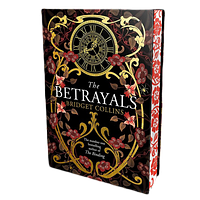You need to sign in or sign up before continuing.
Take a photo of a barcode or cover
Thanks to the publisher HarperCollins and Netgalley for a digital ARC in exchange for an honest review!!
Collins' first novel, The Binding was one of my favourite reads this year after picking it up without knowing anything about it and immediately falling in love with the world and characters she created. When I heard she would be releasing her second adult novel, The Betrayals, I knew I had to pick it up. The novel is set in a sort of pseudo-1930's Britain, with 'The Party', a seemingly fascist government in control, a Ministry of Culture that seeks to kill off the arts and Montverre, a school-university style setting where the students are all male (a point which is given really no context apart from the fact it's meant to be set around the early 20th century) and study the art of the 'grand jeu'. If you asked me what a 'grand jeu' was, I'd honestly not be able to tell you, apart from understanding it's a vague performance of music, drama and sciences together.
Thankfully, it didn't seem to matter too much, similar to some of the ideas she presented about books in The Binding, and I find that Collins creates these concepts as vehicles for everything else and luckily, it works well.
The protagonist, Leo Martin, is a former Montverre student, newly (and forceably) 'resigned' from his job at 'The Party's' Ministry of Culture for sharing views against them and sent back to the school to study the grand jeu once more. There he meets Claire, the Magister Ludi of the school, a headmistress of sorts who knows more about Leo than she lets on. The book flickers between the present, with Leo as a thirty-two year old back at Montverre to diary entries of his second year at Montverre, aged twenty. There we meet Carfax, a genius writer of 'grand jeu' and his rival in study.
The dynamics between Leo and Carfax and then Leo and Claire are beautifully handled however I felt a lot of the tension came too far in to the plot, and the gripping content took place about three quarters of the way though. The diary entry chapters were my favourite to read over the present day ones, as I felt more of Leo's character was explored then, and was interesting to compare his attitudes and character changes to how he interacted with Claire and how he interaction with Carfax. However, I felt the tension and misogyny in the society they live in was never truly given a reason why and the almost 'forbidden' aspect to some parts of the novel felt confusing over trying to understand where a society that openly persecutes Christians stood on women's rights, and same-sex relationships.
Aside from the characters, it's the way Collins envelops magical concepts with characters that have real believable feelings and flaws that keeps drawing me into her writing. The Betrayals captured me less than her previous novel, The Binding however after reading it in one sitting on a rainy morning, I realised how much I felt involved in the novel, specifically towards the end. Overall, I give it four stars and look forward to future writing from Collins, and hope it will capture me just as much as her two adult novels so far have.
Collins' first novel, The Binding was one of my favourite reads this year after picking it up without knowing anything about it and immediately falling in love with the world and characters she created. When I heard she would be releasing her second adult novel, The Betrayals, I knew I had to pick it up. The novel is set in a sort of pseudo-1930's Britain, with 'The Party', a seemingly fascist government in control, a Ministry of Culture that seeks to kill off the arts and Montverre, a school-university style setting where the students are all male (a point which is given really no context apart from the fact it's meant to be set around the early 20th century) and study the art of the 'grand jeu'. If you asked me what a 'grand jeu' was, I'd honestly not be able to tell you, apart from understanding it's a vague performance of music, drama and sciences together.
Thankfully, it didn't seem to matter too much, similar to some of the ideas she presented about books in The Binding, and I find that Collins creates these concepts as vehicles for everything else and luckily, it works well.
The protagonist, Leo Martin, is a former Montverre student, newly (and forceably) 'resigned' from his job at 'The Party's' Ministry of Culture for sharing views against them and sent back to the school to study the grand jeu once more. There he meets Claire, the Magister Ludi of the school, a headmistress of sorts who knows more about Leo than she lets on. The book flickers between the present, with Leo as a thirty-two year old back at Montverre to diary entries of his second year at Montverre, aged twenty. There we meet Carfax, a genius writer of 'grand jeu' and his rival in study.
The dynamics between Leo and Carfax and then Leo and Claire are beautifully handled however I felt a lot of the tension came too far in to the plot, and the gripping content took place about three quarters of the way though. The diary entry chapters were my favourite to read over the present day ones, as I felt more of Leo's character was explored then, and was interesting to compare his attitudes and character changes to how he interacted with Claire and how he interaction with Carfax. However, I felt the tension and misogyny in the society they live in was never truly given a reason why and the almost 'forbidden' aspect to some parts of the novel felt confusing over trying to understand where a society that openly persecutes Christians stood on women's rights, and same-sex relationships.
Aside from the characters, it's the way Collins envelops magical concepts with characters that have real believable feelings and flaws that keeps drawing me into her writing. The Betrayals captured me less than her previous novel, The Binding however after reading it in one sitting on a rainy morning, I realised how much I felt involved in the novel, specifically towards the end. Overall, I give it four stars and look forward to future writing from Collins, and hope it will capture me just as much as her two adult novels so far have.
emotional
mysterious
tense
medium-paced
Plot or Character Driven:
Character
Strong character development:
Yes
Loveable characters:
Complicated
Diverse cast of characters:
No
Flaws of characters a main focus:
Yes
i enjoyed this book, the ending was a little underwhelming, i wa steady for some huge dramatic finish but i eagerly flipped the page just to find “authors note” disclaiming how she basically
copied the story from another book. Kinda made i didn’t read the other one first because it sounds better but oh well not a bad read
copied the story from another book. Kinda made i didn’t read the other one first because it sounds better but oh well not a bad read
I feel like I read it out of order, that maybe this was a central book of a series. It left me wanting, but not horribly so. Like there was more waiting, I just had to find it.
It didn't leave me happy. It left me feeling challenged. I fear that there isn't any more to this story. That maybe I just read a far better and far more beautiful version of the Tiger and the Princess.
There was so much passion and poetry in this book, I felt like should be taking notes if ever I wanted to write a novel.
It didn't leave me happy. It left me feeling challenged. I fear that there isn't any more to this story. That maybe I just read a far better and far more beautiful version of the Tiger and the Princess.
There was so much passion and poetry in this book, I felt like should be taking notes if ever I wanted to write a novel.
challenging
mysterious
slow-paced
Plot or Character Driven:
Character
Strong character development:
Yes
Loveable characters:
Complicated
Diverse cast of characters:
No
Flaws of characters a main focus:
Yes
Si bien al principio la historia tiene un cierto halo de misterio, pronto se hace lenta y tediosa la forma de contar una tensión sexual no resuelta que se adivina casi desde el principio. Ni siquiera "ese" giro en los personajes salvan un libro en el que tenía puestas muchas espectativas tras leer "El encuadernador"
adventurous
slow-paced
The prose in this book is beautiful but I am not sure if it makes up for how lackluster the storytelling & character development was all the way throughout. The climax was clunky, the build up was in-proportionate to what followed, and I found myself feeling disappointed in the end. In a fasciae world, no ending will be satisfying - that I understand. That being said, I still left this book feeling like I wish I had received more rich character building, if nothing else.
adventurous
emotional
mysterious
reflective
sad
tense
slow-paced
Plot or Character Driven:
A mix
Strong character development:
Yes
Loveable characters:
Yes
Diverse cast of characters:
N/A
Flaws of characters a main focus:
Yes
I thought it was going to be five stars right up until the plot twist...and now I know it's not. The worldbuilding/dystopia/politics were an interesting choice. I absolutely loved the grands jeux and the discussions connecting different topics. It genuinely made me want to study which is weird. It delivered on the bridget collins queer romance arc...until it didn't. Honestly I think the ending was okay but the bit leading up to it was clumsy and not at all satisfactory. But then again I don't think there was any satisfying way to end that...So overall I was really disappointed because most of this book was really fucking good but it really let me down towards the end. Unsure how to feel, might update later.
I enjoyed reading this book and i liked the plot twist. But the game itself was very similar to the game that Hermann Hesse wrote about in his book “the glass bead game”. I didn't like this moment at all





